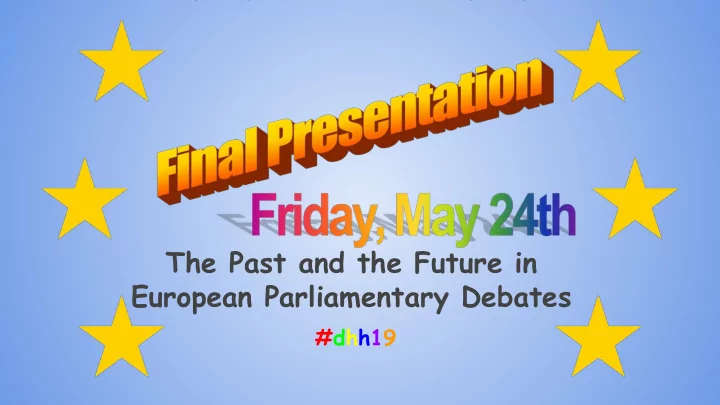

The Past and the Future in European Parliamentary Debates #dhh19
Structure 1. Research Plan & Questions 2. Results 3. Challenges 4. Outlook
Research question - original How does the European Parliament talk about ‘the future’ and ‘the past’? How do these ideas change over time in expression and content? How do they differ between political parties, fractions, ages, genders, geographical regions, etc?
Research question - updated How does the European Parliament talk about ‘the future’ and ‘the past’? How do these ideas change over time in expression and content? How do they differ between political parties, fractions, ages, genders, geographical regions, etc?
Research Plan & Workflow – all done! formulate research question ➔ create theoretical groundwork ➔ prepare data ➔ develop tools and pipeline ➔ create subcorpora ➔ analyse subcorpora ➔ interpret results ➔ visualize results ➔
Update on Communications
the future subjective & influenced by our morals, “what we think, know, hope and fear will ideologies, politics and ideas happen” political discourse & debate history selective, subjective & influenced by our “what we think happened” morals, ideologies, politics and ideas the past objective, but unreachable “what really happened”
the future subjective & influenced by our morals, “what we think, know, hope and fear will ideologies, politics and ideas happen” political discourse & debate history selective, subjective & influenced by our “what we think happened” morals, ideologies, politics and ideas the past objective, but unreachable “what really happened”
Motivation “The fact that the outermost regions exist is tied up to a large degree with colonial history. In the Middle Ages, those regions and their people did not belong to Europe, and even today, they are not really considered to be European.” (Erik Meijer, 25 October 2000, Strasbourg)
Whole corpus 247.955 speeches in English ● 50.432.891 words ● 2.004.716 sentences ● metadata: ● speaker: name ○ speaker: country ○ speaker: political functions ○ speaker: gender ○ speech: date ○ speech: topic ○ 2013 change in Protocol ● after 2013 99.7% of english speeches ● from UK and Ireland.
Creating Subcorpora
Creating Subcorpora Past Future 13.230 speeches 5.430 speeches Totalitarianism Climate change 4.517 speeches 13.541 speeches Overall: 247.955 speeches
Discussion of findings
Key Results How does the European Parliament talk about ‘the past’ and ‘the future’? Past ↔ Future Past: common European history, including institutional, cultural and territorial developments of the EU Future: economic growth, stabilisation → environmental policy
General Findings
Construction of Future
What can you do (more) with: Past | Future
Topic Modelling
Topic Modelling
Sentiment Analysis Speakers seem to be less ● Suh emotional and more concrete while talking about the future. The results are similar for ● genders and countries.
Sentiment Analysis Past Future
Sentiment Analysis Sentiment Count
Qualitative Analysis
Case Study: 20 th Century Totalitarianism “In other words, in Europe the transnational memory runs up against a variety of national memory constellations and collisions.” (Assmann 2006) Research Question: How is the horseshoe theory present in discourse on the topic and how does it differ by region (East/West)?
Hitler and Stalin are strongly connected in discourse, with no significant differences between East and West → i.e. “Hitler” most frequently mentioned with “Stalin” and vice versa
Case Study: 20 th Century Totalitarianism → The collective suffering of almost all EU member states under Nazism or Stalinism can potentially serve as a framework for a transnational culture of remembrance and historical identity. → Further analyses on the topic are needed in regard to the variables of age and political ideology, where there may be significant differences in potentially equating Stalinism and National Socialism. Sentiment analysis could be useful in this regard.
Case Study: The Climate Crisis “Climate change is one of the greatest challenges of our time.” - Peter Mandelson, European Parliament plenary session 23.10.2007 Research Question: How is climate change talked about in the European Parliament? Are there differences in the way different countries speak of climate change?
Case Study: The Climate Crisis Climate change, CO2/carbon dioxide, emissions, greenhouse gases, acid rain/ozone layer, global warming, renewable energy, alternative sources of energy, Kyoto protocol, climate conference, environmental regime, energy efficiency, carbon footprint, carbon tax, biofuel, emission targets, paris agreement, emission trading, carbon neutrality, climate scepticism, cutting carbon emissions, Polar ice cap, biodiversity, fluorinated, fuel consumption, IPCC (Intergovernmental Panel on Climate Change) report
Case Study: The Climate Crisis
Case Study: The Climate Crisis
Case Study: The Climate Crisis
Case Study: The Climate Crisis False positive (1, 1) “Climate change is the greatest challenge facing life on our planet, the biggest problem facing our governments, and a gnawing worry for our citizens” False negative (-0.15, 0.75) "Therefore it is absolutely necessary to bring them on board so that we can fight climate change together , but according to the common but differentiated principle of the United Nations Convention"
Case Study: The Climate Crisis Finland Spain
Challenges Defining the past and the future: - How to detect it in the corpus? Data: - Missing English translated speeches and missing metadata - English corpus included other languages - Problems with variables within the data - Drop in number of speeches after 2013
Outlook Still more work to do: - Look at differences between political parties - Issues with the dataset should be resolved - Dataset could be updated with more recent data
Reviews of the group “10/10 would hack again.” – Fredrik Norén ★★★★★ “All group members are very intelligent and attractive.” – Andrey Indukaev
One more thing…. Don’t forget to vote on Saturday/ Sunday!
Recommend
More recommend